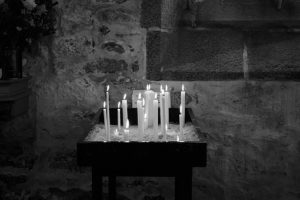“If I really wanted to pray I’ll tell you what I’d do. I’d go out into a great big field all alone or in the deep, deep woods and I’d look up into the sky—up—up—up—into that lovely blue sky that looks as if there was no end to its blueness. And then I’d just feel a prayer.”
― L.M. Montgomery, Anne of Green Gables
My friend Robin and I had a long talk one morning about prayer. Going to God with a list of needs and wants brought some answers. Still, in her experience, many requests seemed unresolved over the years and left her discouraged.
I know what she means. I’ve been caught in that same cycle of disappointment. Some of that pointed to my own flawed beliefs and patterns.
 For starters, my prayers were often a revolving door of fret. Instead of releasing concerns to God, I’d keep them and remain weighed down.
For starters, my prayers were often a revolving door of fret. Instead of releasing concerns to God, I’d keep them and remain weighed down.
God spoke to me recently through the word “crease.” The dictionary definition says, “a wrinkle or furrow in the skin, typically of the face, caused by age or a particular facial expression.” Surely, fretful prayers produce wrinkles!
But a crease is also like a rut—“a long deep track made by repeated passage,” or “a habit or pattern of behavior that has become dull and unproductive but is hard to change.” Fretting prayers can become a dead spiritual habit. We do it because we don’t know what else to do. But unanswered prayers can stoke the fires of discontent and unbelief.
Bill Johnson, Senior Pastor of Bethel Church in Redding California said that many of God’s people are like a dislocated arm. They are alive but not functioning because of disappointment. And so our prayer life actually becomes another tactic the enemy uses to keep us dismayed and far away from God.
How did this happen? Prayer should connect us to God in ever increasing ways!
 St. John of the Cross understood centuries ago that many virtuous spiritual disciplines (even prayer) could actually become vices if they’re merely a religious habit— especially when our rituals lead to expectations that are more important than God.
St. John of the Cross understood centuries ago that many virtuous spiritual disciplines (even prayer) could actually become vices if they’re merely a religious habit— especially when our rituals lead to expectations that are more important than God.
Our Father has to let these things die in us.
“In prayer it is better to have a heart without words than words without a heart. ” ― John Bunyan
God doesn’t want us to quit praying—yet He has things to teach us about it.
 In my own life, I stopped praying for a while when trapped in a cycle of disappointment. The vacuum felt uncomfortable. I’d say, “Lord, I’ve lost the plot…” or “I don’t know how to pray anymore.”
In my own life, I stopped praying for a while when trapped in a cycle of disappointment. The vacuum felt uncomfortable. I’d say, “Lord, I’ve lost the plot…” or “I don’t know how to pray anymore.”
Some mornings after long periods of silence I’d say, “Your will be done, on earth as it is in heaven.” A safe prayer, indeed. I didn’t want any more disappointment.
Old habits are difficult to change. But silence and waiting turned into fertile soil for something new.
“…Transformation is painful, but you’re not falling apart, you’re falling into something different, with a new capacity to be beautiful.”
–William C. Hannan, A Merry Mishap
One morning God said very gently, There are greater things as stake than what you ask.
“True…” I said. “I don’t see what You see, or know what You know—all the more reason to limit my prayers.”
 Still short prayers for people and situations would rise up spontaneously. Would they boomerang back to earth with a note saying, “Sorry, you just don’t get it”?
Still short prayers for people and situations would rise up spontaneously. Would they boomerang back to earth with a note saying, “Sorry, you just don’t get it”?
One day while driving, I found myself praying about a few things. Immediately in my mind’s eye, I saw a hand writing down every word of it. The same thing happened later in the day. That night, I laid awake thinking.
Your prayers matter, He whispered in the darkness.
 Eventually tears streamed down my hot cheeks. A boatload of disappointment had to go before God could do something new in my prayer life. Grieving takes time. Months, even years.
Eventually tears streamed down my hot cheeks. A boatload of disappointment had to go before God could do something new in my prayer life. Grieving takes time. Months, even years.
“For the happy man prayer is only a jumble of words, until the day when sorrow comes to explain to him the sublime language by means of which he speaks to God.”
― Alexandre Dumas, The Count of Monte Cristo
Gradually, something different started to emerge.
First of all, prayer has to be a conversation. No more long monologues of everything I want God to do as I see it. “What do you see Lord?”… “How should I pray?”
Secondly, prayer means bringing something to God and leaving it. No more revolving door. Having said that, there are times when the Holy Spirit prompts me to contend for something, but that is entirely different from fretting or pleading which come from fear. Contending is challenging and resisting the enemy on a matter, proclaiming things that God wants into spiritual realms.
 Finally, prayer has to come from a foundation of peace—an unshakeable certainty in the goodness of God. Bill Johnson says to get there we must embrace the category of “mystery.” And I believe this has to be an intentional choice.
Finally, prayer has to come from a foundation of peace—an unshakeable certainty in the goodness of God. Bill Johnson says to get there we must embrace the category of “mystery.” And I believe this has to be an intentional choice.
There’s much more to learn. What is God showing you about prayer?








Excellent post! Such useful, important help here for those of us too familiar with prayer at times to remember the openness and relaxed posture required. Thanks, Susan, my wise friend.
Thanks Mick! Means a lot coming from you. 🙂
Finding myself once again in a very uncertain phase in life, your words come as a tremendous and comforting gift. I am always aware, often uncomfortably so, of the obvious correlation in the frequency and desperation in my prayers and my inability to be with certain sections of the path God has prepared for me. As I proceed however, I realize that while submission may have been the motivating force behind my prayer, surrender is called for in order to relieve the tension; as you put it, “the revolving door”. I forget this, often. I am constantly astounded however that this revelation always brings abundant relief and light. There is no shortage of God’s love, which allows us to let something die in us, I guess there is a shortage of my memory!
PS
Loved “falling into something”
Pete! Your struggle is so familiar to me, and you have such a gift of putting it into words. You must be a writer?! Anyway, to me the fruit of a good prayer life is peace, and often it comes supernaturally in the midst of unresolved situations. Thanks so much for taking time to comment!